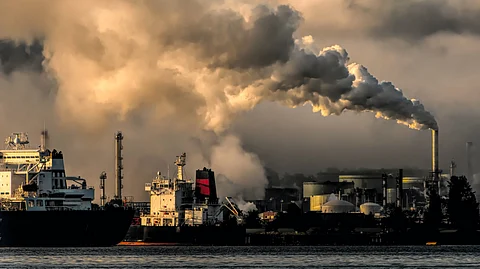

On Thursday, Delhi Chief Minister Arvind Kejriwal declared that all government and private primary schools in the capital city would remain shut for the next two days due to the deteriorating Air Quality Index (AQI).
Delhi NCR found itself immersed in dense smog, adding more concern to the worsening air quality. The AQI had been deteriorating day by day, which is a point of concern. The Weather Department recorded the AQI of Delhi as 364 on Wednesday, 359 on Tuesday, 347 on Monday, 325 on Sunday, 304 on Saturday, and 261 on Friday. According to the data provided by the Central Pollution Control Board, the AQI had worsened to 417 by 8 P.M.
Various factors like vehicle emissions, industrial waste, pollution from neighboring states, and meteorological conditions contribute to the hazardous air quality, leading to a high health risk. Doctors have issued cautions about aggravating respiratory problems.
The Delhi government has also prohibited all non-essential construction work in Delhi-NCR and restricted the entry of diesel trucks into the national capital to curb air pollution. These restrictions have been implemented as part of Stage III of the Graded Response Action Plan (GRAP) under the Commission for Air Quality Management (CAQM).
The Municipal Corporation of Delhi (MCD) ordered, "All pre-school, pre-primary, and primary classes (i.e., nursery to class V) in physical form are ordered to be closed on November 3, 2023, and November 4, 2023 (i.e., Friday and Saturday). Teachers of these classes shall manage classes in online mode. Heads of schools are to inform the parents of students of the above classes immediately."
What is AQI?
The Air Quality Index is a tool to measure the seriousness of air pollution by assessing various attributing pollutants and their associated risks. The AQI ranges from 0 to 500. The lower the number, the safer the air quality, while a higher number indicates a higher level of dangerous pollutants. The AQI system is valuable to alert people about air quality, recommend appropriate measures, and highlight potential health issues.
AQI categories into 6 segments:
1. Good (0–50)
2. Satisfactory (51–100)
3. Moderately Polluted (101-200)
4. Poor (201-300)
5. Very Poor (301-400)
6. Severe (401-500)
This deteriorating AQI poses a risk to people with specific demographics or health groups. Children and infants are more susceptible to the harmful effects of pollutants as their respiratory systems develop. Those with respiratory conditions like asthma, bronchitis, and respiratory ailments are at heightened risk. Poor air quality can complicate the heart conditions of people with cardiovascular disease. During worsening AQI, several precautionary measures need to be taken for all, especially school children, to protect their health. Using N95 masks to reduce the inhalation of pollutants, organizing indoor activities to decrease outdoor exposure, and ensuring proper ventilation in classrooms are essential. Educating students about the importance of maintaining personal hygiene and seeking medical attention if experiencing any discomfort due to poor air quality. These preventive measures will surely decrease the side effects of poor air quality.
(Input from various media sources.)
(Rehash/Komal Bhoi)
